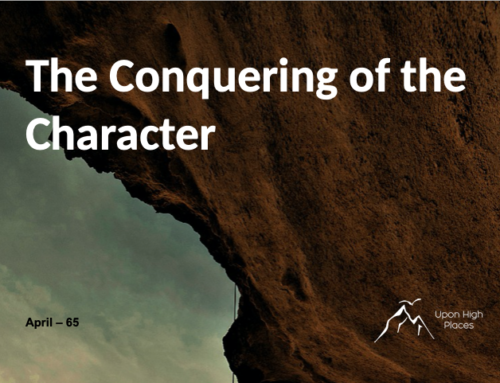Unions that bless – Part 2
July 2022
My dear youth:
In the previous pastoral letter we delved into an exciting topic that concerns every young person who wants to establish a family. The happiness of each individual depends on the kind of decisions he makes in his life. In fact, the Lord calls upon each of his sons and daughters to make the choices that will lift, ennoble, and make them happy. “I have set before you life and death, blessing and cursing; therefore choose life, that both you and your descendants may live.” Deuteronomy 30:19. “Choosing life” means deciding to do things according to the divine parameters that appear in the Word of God. And when it comes to marriage, the Bible has much to offer us. Let’s continue exploring those steps that every young person should take before getting married.
Getting to know each other
As we have seen, knowing the other is of the utmost importance to know if that marriage relationship can be maintained over time. It is convenient, therefore, to dedicate a prudential period to get to know each other. It is a time to discover the other, to know more about her or him, to see if their interests coincide, what kind of thoughts they have, aspirations, ways of being, what they mean to each other, what is the mutual vision of life marriage, children, the church, the world, etc. It is not good to skip this time and go directly to the wedding. You have to take into account a time dedicated to courtship and allow other experienced and consecrated people to give some advice.
The tendency of the couple is to think that no one needs to guide or advise them, that they are enough. This is why the advice of experienced parents, pastors, or relatives is generally rejected. “If you are blessed with God-fearing parents, seek counsel of them. Open to them your hopes and plans, learn the lessons which their life experiences have taught…” The Ministry of Healing, pg. 359.
“Should a son or daughter select a companion without first consulting the parents, when such a step must materially affect the happiness of parents if they have any affection for their children? And should that child, notwithstanding the counsel and entreaties of his parents, persist in following his own course? I answer decidedly: No; not if he never marries. “Honor thy father and thy mother: that thy days may be long upon the land which the Lord thy God giveth thee.” Here is a commandment with a promise which the Lord will surely fulfill to those who obey. Wise parents will never select companions for their children without respect to their wishes.” Letters to Young Lovers, pg. 45.
Some ask how long the courtship phase should last. Neither too long nor too short, I would say. Common sense should be used in this matter. A long period of time is not good because there is a risk of breaking chastity; the short one is also not convenient because the marriage takes place without knowing each other well. the bible tells us: “To everything there is a season, a time for every purpose under heaven.” Ecclesiastes 3:1. What would be a reasonable time, then? In the first place, it is convenient to extend the time of friendship with the other without sentimental commitment in order to get to know each other better. When there is commitment, feelings lose their objective capacity when evaluating certain negative attitudes of the other, because there is a great danger of idealizing them. Second, if the courtship is moving forward, a period of two or three years would be most prudent.
Authors Ben Young and Samuel Adams, in their book The Ten Commandments of Dating, quote author Neil Clark Warren who in his book, Finding The Love of Your Life, refers to an empirical study conducted by researchers at the University of Kansas, where the following conclusion is reached: “Couples who have been dating for more than two years are the ones that obtain the most points in marital satisfaction.” The Ten Commandments of Dating. Young, Ben and Adams Samuel, Editorial Caribe, 1999. Nashville, TN, pg. 53.
It is quite common to find couples who think that their case is different and that their love is so great that they can ignore this evidence, but in practice failures are seen. The best we can advise is not to rush, take the time to get to know each other. “If those who are contemplating marriage would not have miserable, unhappy reflections after marriage, they must make it a subject of serious, earnest reflection now. This step taken unwisely is one of the most effective means of ruining the usefulness of young men and women. Life becomes a burden, a curse. No one can so effectually ruin a woman’s happiness and usefulness, and make life a heartsickening burden, as her own husband; and no one can do one hundredth part as much to chill the hopes and aspirations of a man, to paralyze his energies and ruin his influence and prospects, as his own wife. It is from the marriage hour that many men and women date their success or failure in this life, and their hopes of the future life.” The Adventist Home, pg. 43.
Some young people do not understand that courtship is not marriage, but a time prior to it in which the couple are getting to know each other, and this means that they can realize that the other does not satisfy them and that they can and should break the relationship without remorse heavy conscience, or any trauma. Better is a good pain before the wedding for a time, than a lifelong bitterness after marriage. During courtship, the couple can “divorce,” that is, separate and seek another relationship. But once married, the couple cannot get divorced, if they wish to do the will of God; at most they can aspire to separate and live each on their own without remarrying. Why live this harrowing experience that can be avoided with prayer, fasting, and common sense during courtship?
If the relationship does not work out in courtship, one should not fall into the mistake of thinking that later, during the marriage, everything will fall into place. No, on the contrary, it will get worse as practice shows. Bad courtships become chronic during marriage and that is why the Spirit of Prophecy advises in these cases to break up before getting married:
“Even if an engagement has been entered into without a full understanding of the character of the one with whom you intend to unite, do not think that the engagement makes it a positive necessity for you to take upon yourself the marriage vow and link yourself for life to one whom you cannot love and respect. Be very careful how you enter into conditional engagements; but better, far better, break the engagement before marriage than separate afterward, as many do.” Counsels for the Church, pg. 123.
Don’t make the mistake, at the end of the relationship, of continuing to give the other person hope. It is not Christian to send a third person to communicate the news; the interested party must do it decisively and show the reasons. I have known cases in which one of the partners broke off the relationship without saying anything to the other, the person simply disappeared overnight, without further ado, and of course this caused a lot of pain in the other person.
Responsibility
In Spanish there is a saying that says: “With you bread and onion,” it means that if there is true love, it does not matter if the couple has money or not, if they live in a house or under a bridge, if they have enough resources to support themselves, their children, if any, etc. But this is a wrong view of life. No one should get married without having economic autonomy. One thing is to receive financial help from the family of the spouses, and another is to depend completely on it or on other people. The Word tells us about this when it says that “a man shall leave his father and mother and be joined to his wife, and they shall become one flesh.” Genesis 2:24. It is like breaking the umbilical cord of family dependency.
Although it seems like a well-known and well-spoken topic, the domestic economy has a lot to do with the happiness or misfortune of the couple. Many believe that their love is so deep that they will be able to weather any storm, even if they have few financial resources. But at the moment of truth, money problems bring bitter reproaches, arguments, discontent, frustrations, and even separation. It has been seen in practice that the lack of financial resources in the home breaks many marital relationships that seemed strong at the beginning. A third of married adults say that lack of money is one of the most powerful reasons for causing conflict in the home and a leading cause of divorce, according to some experts.
This should lead the engaged couple to think that they should not take steps towards marriage if they have not resolved the modus vivendi for their marriage, that is, how they are going to support themselves and use the financial resources, what their source of income is going to be. Excessive debts, uncontrolled expenses, the lack of a stable job and other things can make the luck of the spouses very bitter. The best thing will be that before getting married the monetary aspect is solved and there are enough resources to live in peace.
“Had Brother and Sister B been economical managers, denying themselves, they could ere this have had a home of their own and besides this have had means to draw upon in case of adversity. But they will not economize as others have done, upon whom they have sometimes been dependent. If they neglect to learn these lessons, their characters will not be found perfect in the day of God.” The Adventist Home, pg. 395.
Independence and interdependence
Something that those of you who want to get married will have to consider is the kind of character he or she has. “Let those who are contemplating marriage weigh every sentiment and watch every development of character in the one with whom they think to unite their life destiny.” The Ministry of Healing, pg. 359.
If he is authoritarian, domineering, controlling, and abusive, it will be difficult for him to be happy and the opposite in the case of her. It is true that few couples reach perfect unity when they get married, according to the spirit of prophecy, and that waiting for perfect unity immediately is not the most prudent thing to do, so as not to be surprised. “However carefully and wisely marriage may have been entered into, few couples are completely united when the marriage ceremony is performed. The real union of the two in wedlock is the work of the after years.” The Ministry of Healing, pg. 359.
But this does not mean that we should take the marriage step by skipping all the biblical and testimonial teachings that are given to us for our own good and the advice and admonitions of our loved ones. Although the marriage is forged taking the correct steps and under the approval of God, it will always be necessary to display all the love in the world and enough patience, tolerance, and understanding to overlook the faults of the other that can suddenly be discovered and at the same time recognize the good qualities that we all have. Once married, the couple must learn to live together peacefully, with love and respect. The husband should never impose himself as the “head” of the family, overriding the opinion of his wife, nor should she trample on, despise, or mistreat her husband.
“Neither the husband nor the wife should merge his or her individuality in that of the other. Each has a personal relation to God. Of Him each is to ask, ‘What is right?’ ‘What is wrong?’ ‘How may I best fulfill life’s purpose?’ Let the wealth of your affection flow forth to Him who gave His life for you. Make Christ first and last and best in everything. As your love for Him becomes deeper and stronger, your love for each other will be purified and strengthened.” The Ministry of Healing, pg. 361.
Conclusion
There are many things we can still say about marriage, but when the couple gets married, it’s not that everything is already built, no. It is a process of building a wonderful project that will last a lifetime. There will always be things to learn. Situations will always arise that will force the spouses to seek solutions in Christ and this will constantly mature them, make them grow, and perfect their love. “To gain a proper understanding of the marriage relation is the work of a lifetime. Those who marry enter a school from which they are never in this life to be graduated.” The Adventist Home, pg. 105. Que Dios os bendiga. Amén.
José Vicente Giner
Pastor and leader of the Youth Department
of the General Conference
For personal and group reflection:
1. Is it possible to get to know each other before marriage?
2. What should be known about the other before getting married?
3. What does it mean that people should be responsible?
4. Why is it not good to fuse the personality or individuality of one with the other?
5. How can individuality be maintained without losing unity?







